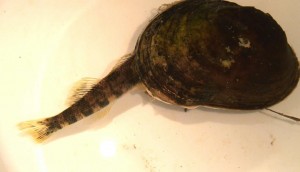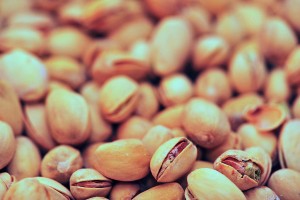Are you surprised that some mussels thrive in freshwater, in our rivers and streams here in Ohio? Do you know that freshwater mussels are distinct from their saltwater cousins?
This is a Freshwater Mussel.

This mussel probably tastes fairly terrible. Unlike most organisms consumed by humans, it will not be significantly improved by the addition of butter. It’s not eating the fish on the left, it is using it to reproduce. More on this subject later.
There are, at least in Ohio, some important laws against trying to eat (or pick up) any of these mussels. It is not worth it, so don’t try.

Freshwater mussels are parasitic, and some of them, like this Lampsilis ovata, lure in their fishy hosts by growing fancy mantle flaps and wiggling them like a fish.
If you’re curious, you can see videos of mantle flapping and further explanation of why the mussels show this behavior at the Columbus Zoo Freshwater Conservation and Research Center webpage. Unlike saltwater mussels, fertilization for freshwater mussels takes place internally. Sperm gets released into the water, and is taken in to the body of the female who then parasitizes a fish in a variety of ways.

This is how the Riffleshell Mussel Epioblasma torulosa rangiana lives. Species vary somewhat, but in general freshwater mussels are not bound to anything, and are free to scoot around with their big muscular foot. They usually bury themselves in the substrate and happily filter water all day long.
Another quality that is important regarding potential consumption is that many freshwater mussels live a very long time before reaching “edible” size. That means that they have been filter feeding in a river day-in, day-out, and this is a recipe for dangerous bio-accumulation if there ever was one.
This is a Saltwater Mussel

Marine mussels like this one fall somewhere between “delicious” and “you should try it at least once”. They are great with butter and lemon juice. Easily raised in captivity, these are common in grocery stores and restaurants. By Darkone 2003, CC BY-SA 2.0
The nice thing about saltwater mussels is that they reach edible size in about a year and a half, so they will have accumulated fewer, potentially harmful substances from the environment.

The family containing edible saltwater mussels, the Mytilidae, anchor themselves to solid surfaces using byssal threads for the majority of their lifespan. by Mark A. Wilson (The College of Wooster), Public Domain
Saltwater mussels reproduce externally. Fertilization takes place in the water outside the body of the organism and results in tiny larval mussels that float around for a while until the lucky ones find a nice solid place to settle down and stretch out some byssal threads. There they are anchored for life.
This is a Pistachio

Edible to a fault, the pistachio carefully disguises itself as as a mussel to discourage careless consumption. By Madmaxmarchhare 2008
Both saltwater and freshwater mussels are aquatic bivalve mollusks who filter food out of the water column. Pistachios are terrestrial plants.
Coming up: The Phylogenetic Distinction
About The Author: Sara Klips is the Mussel Fairy. She graduated from The Ohio State University with a degree in zoology. She secretly designed the logo for the department of Evolution, Ecology, and Organismal Biology.
Thanks for this great (and humorous) post. I love the pistachio/mussel comparison, in my experience they both taste wonderful.
The staff at Pututogel is friendly and professional. Pututogel